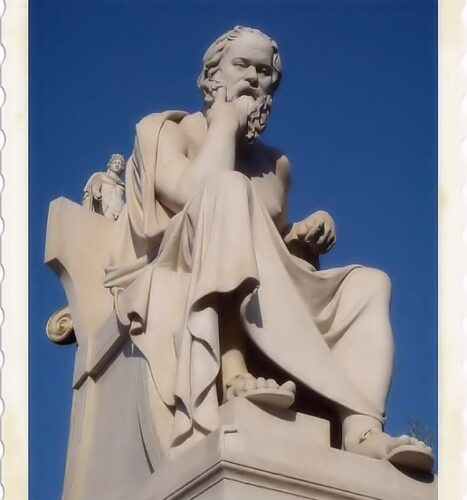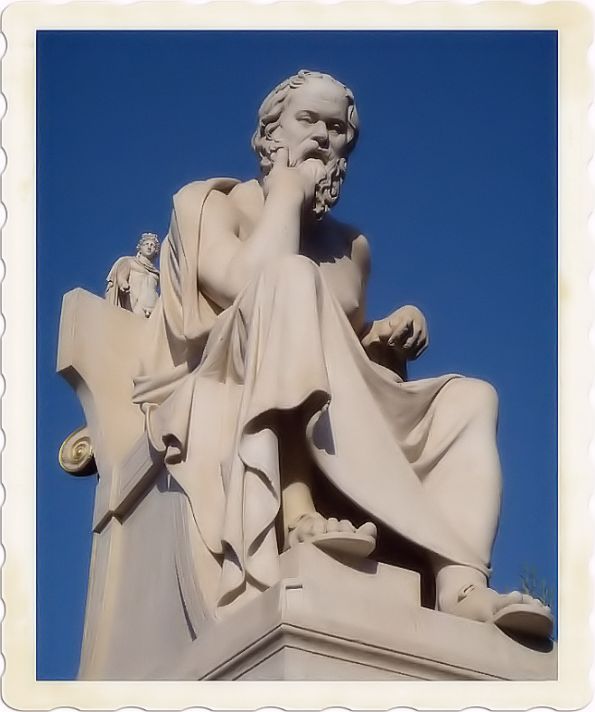
Introduction to Daimonology. The basics of Daimonology. A new cultural and methodological approach, encapsulated in 100 powerful, original, and occasionally enigmatic aphorisms by its founder Carl William Brown, to the enhancement and diffusion of creative, communicative, and interpretive thinking.
Character is destiny, that is, our life is closely linked to our behavior and vice versa.
Carl William Brown
When all the souls had chosen their lives, they went before Lachesis. And she sent with each, as the guardian of his life And the fulfiller of his choice, The Daimon that he had chosen.
Plato, Republic X
Adapting certain features of Empedoclean daimonology, Plato formulated a more rigorous theory of daimonification through virtue. He daimonified the soldiers of his ideal republic for their courage, and daimonified rulers (“guardians”) for their wisdom. In his Cratylus, Plato vouched for the daimonification of all people who were noble and wise. Plato’s Timaeus introduced the ultimate democratic principle of daimonification by identifying one’s guardian daimon with humanity’s higher consciousness (or nous).
Carl William Brown
Great Zeus, Father of men, You would deliver them all from the evils that oppress them, If you would show them what is the Daimon of whom they make use.
Pythagoras
Great spirits have always encountered violent opposition from mediocre minds.
Albert Einstein
Those who are able to see beyond the shadows and lies of their culture will never be understood, let alone believed, by the masses.
Plato
Daimonology has no hierarchy, but only the spell of universal anarchy.
Carl William Brown
Until you make the unconscious conscious, it will direct your life and you will call it destiny.
Carl Gustav Jung
Ethos anthropoi daimon. (Character is destiny).
Eraclitus
The soul always metaphorizes.
Plotinus
Very often there is nothing more unconscious than our ignorance, of which we obviously disregard the existence; therefore opening the mind to the ethics of knowledge and cultivating one’s learning is the only wise thing to do in order to give a sense to our mysterious life.
Carl William Brown

Freud said that natural heritage and fate “Δαίμων Καί Тύχη” (Daimon kai tuke) decide the destiny of a man; seldom, if ever, any of these forces. Obviously we must also personally interfere in this process and, through cultural, educational and creative commitment, try to lead our existence in the most constructive way possible and imaginable, both for ourselves and obviously for others, aware in any case, as the Buddha said that life is pain,
That said, let’s immediately clarify any form of doubt and possible misunderstanding; although the etymology from which these terms derive is the same, “daimonology” has nothing to do with “demonology”, nor with “daimonism”, nor with spirits, demons, divine voices, or anything else, but it is essentially a “methodology” to move within different disciplines and various human culture, both humanistic and philosophical, or scientific and technological.
The term “Daimonology” derives from the Greek word Daimon which means genius, guiding spirit, divine power, and also demon, or lower divinity or deified hero, but not only, in fact the verb expressed by this word also meant to divide, distribute, share and the suffix “da” was similar to many words such as democracy, demiurge and other terms that derived from the name “demos” meaning people, and perhaps this is why it was never frowned upon by the official power, which he did not want to share his privileges and saw in the genius of criticism the demon of evil.
Daimonology therefore takes its name from the original term Daimon and from the term Lògos which in Greek thought indicates the “word” as it is articulated in speech, therefore also the “thought” that is expressed through the word. A precise affirmation of the lògos as “reason”, and refers to the mythological creations of Plato, to the interpretation of Socrates, Heraclitus, Aristotle and other philosophers of antiquity, without thereby intending to constitute either a new philosophy, much less a new one religion, but I repeat that it is only a cultural and pedagogical methodology.
Although the term Daimon also appears central to eudemonism, i.e. the moral doctrine which places the good in happiness (eudaimonia) and pursues it as a natural end of human life, Daimonology is not intimately connected to this concept, even if its practice and its principles can partially facilitate its realization, which is always and in any case difficult if not impossible to achieve.
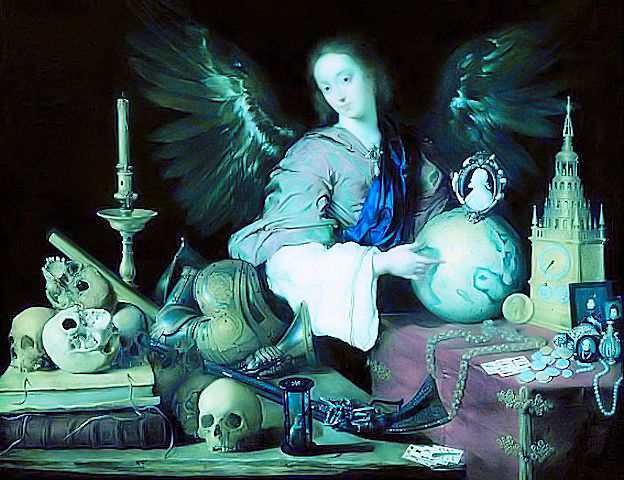
The term eudemonism comes from the Greek “εὐδαιμονισμός” (eudaimonismòs), from “εὐδαιμονία” (eudaimonìa), composed of good (εὖ èu) and guiding spirit-fate (δαίμων dàimōn), a term that can also be associated with “divine being”, “genius”, “spirit guide” or “consciousness” ”. In a broad sense, “eudemonia” means “to be in the company of a good spirit”. We recall that “eudemonism” must be distinguished from “hedonism” which proposes the “achievement of immediate pleasure” as the end of human action, understood as enjoyment (as the Cyrenaic school of Aristippus thought) or as the absence of pain (according to the Epicurean conception).
Daimonology does not make any reference to the Daimon either as a spiritual entity, or as a demon, much less as the soul of the human being, let’s say rather that it connects the term in a metaphorical way to one’s individual fate, as already outlined by Plato in the myth of Er in the Republic, and the character of the individual, as already maintained by Heraclitus and also by Freud, intends it as a personal inclination, an aptitude, a predisposition, in the manner of Aristotle, and therefore considers the definitions that gradually elaborated as a method for choosing and improving one’s vocation, one’s character, one’s behavior, one’s conscience, in order to improve one’s creative genius and one’s patience.
Before delving into the etymological and interpretative question of the term Daimon, I want to add that Daimonology uses all the tools available and available in our world to understand the reality that surrounds us, i.e. for example activities such as meditation, reading, interpretation, reflection, critical disposition, observation, experimentation, curiosity, introspection, and obviously follows the ethics of knowledge and humility of research, aware that there are certainly more things than the human being does not know, compared to those he knows and for this he relies on the power of imagination and fantasy, to be able to better decipher the mysteries that surround us, but always without exaggerating, in fact beyond a certain ironic approach, humorous, surrealistic and provocative, it always remains closely linked to the principle of reality, and although at times it may seem deliberately enigmatic, it always relies on the more concrete rationality and the more genuine creativity of the human being.
Plato writes: “The demon will not choose you, but you the demon (…). Virtue has no masters; the more each of you honors her, the more she will have; the less he honors her, the less he will get. The responsibility, therefore, lies with those who choose. God is not to blame.” This daimon, which we can also call “genius”, an inescapable component of our ego, can sometimes be lost sight of, not cultivated, set aside, but sooner or later it will come back to possess us totally, to define our image, our true personality. For Plato, therefore, we are what we have chosen to be.
In short, each of us has his own personality, his own vocation, his own image, his own character, his distinctive traits, not only physical, but clearly also mental, and all these elements radically distinguish us, but everything is however in transformation, things change, everything flows, and therefore it is up to our seriousness to look for the right motivation and then feed it with the utmost commitment, trying to do what we are doing in the best possible way, paying attention to improve day by day the our possibilities, to make our existence truly authentic and useful, not only for ourselves, but also for our neighbors and for the society in which we live.
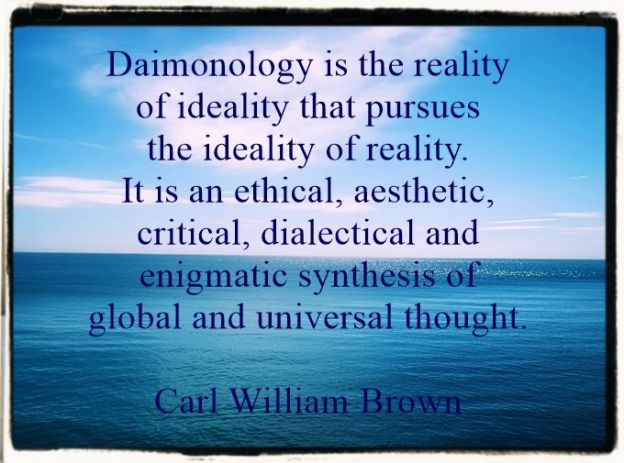
In Er’s story, the “dæmon” does not happen by lot, but is the object of a choice. Freedom of choice makes virtue “without a master”, unlike what happened in traditional morality, where this was the prerogative of a well-defined social figure, the “aristos”, or in any case of an extremely small group. Also for Daimonology therefore a fundamental concept is that of choosing one’s own path, activity, inclination or passion which obviously can also be innate, but the fundamental idea is to cultivate one’s talent and improve one’s behavior in order to develop all human intelligence.
Going back to the profound meaning of the concept and to the character related to the personal Daimon by Heraclitus and then also by Freud, I feel I am very close to Aristotle who believed that each individual was endowed with a particular vocation, with a special inclination, I could add a more or less creative genius, which he called precisely “daimon”.
Therefore, for the undersigned, everyone has his own Daimon which must be protected, studied, deepened, researched, perfected, cultivated, and placed in close relationship and communication with the most intimate, intellectual and spiritual part of our person. Let’s also say that it is a symbolic and metaphorical element that characterizes us and that should push us towards good and therefore constant improvement, or towards more problematic and perhaps harmful experiences for ourselves, which is why in this case it would be a negative Daimon, that instead of helping us get better, it would do its utmost to make us feel worse. In any case, the Daimon is always identified with ourselves and is obviously not an element external to our individuality.
Daimonology does not even consider the Daimon in the manner of Socrates, but we reiterate that it is only a methodology that takes its name from the original term Daimon, understood as genius, we can therefore say that it is a discourse on the genius of humanity. Socrates, on the other hand, referred to a daimon or “divine guide” who often assisted him in every decision he made. It would be a sort of “moral conscience” that gradually reveals itself as a form of delirium and divine inspiration, a voice identifiable as the authentic nature of the human soul, its newfound self-awareness.
Based on Plato’s testimony, the daimon of which Socrates speaks consists in fact of a divine presence, similar to a tutelary genius, which makes itself felt in him through signs to stimulate his reason to make the most suitable choice, but not so much to to induce him to carry out certain actions, rather than to distract him: “I don’t know what divine and demonic spirit is inside me; precisely that of which Meleto, jokingly, wrote about in the indictment. And it’s like a voice that I’ve had inside since I was a child; who, whenever she makes herself heard from me, always dissuades me from something I’m about to do, and never makes me any proposals.” (Apology of Socrates, 31 d)
The term Daimonology (Daimonologia), before its use by Carl William Brown in 1998 had never been officially used, except in a brief quotation by an American author regarding Hellenic culture and religions of the time. This observation was verified and confirmed through an in-depth search on various encyclopedic texts, both paper and electronic, and through an extensive search on the net using for the purpose the best search engines active around the year 2000. In any case, since the term “daimon” already existed it was not entirely impossible to perhaps add a suffix or a prefix to it; the situation is different if we understand Daimonology as a real discipline and as a rigorous and effective research and study methodology, in fact it had never been used in this sense: the undersigned is therefore its inspirer and organizer to all effects.
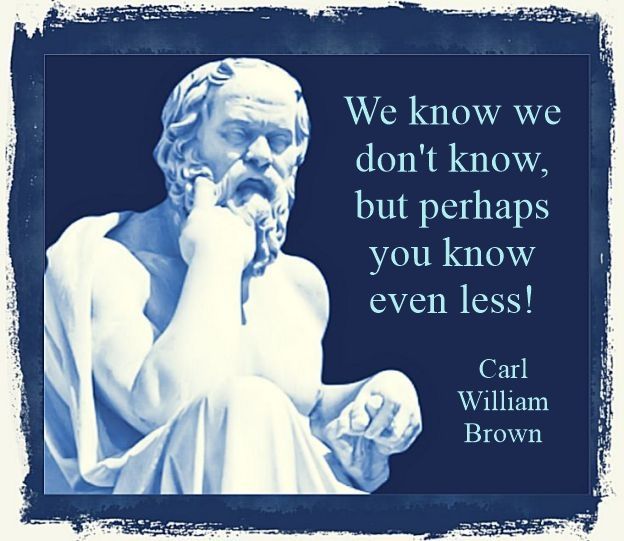
The newly coined term also indicates a real current of thought as well as, as we have already said, a new and innovative methodology of study and creative investigation. Also in this case, the undersigned humorously and provocatively refers to the term Lucifer, or light, which indicates a new symbol of brotherhood, equality, freedom, also in honor of Voltaire who called D’Alembert and Diderot “his brothers in the devil ”, and basically wants to represent a sort of new enlightenment or renaissance of thought, if you prefer!
Daimonology in its literary form consists of 100 definitions or aphorisms, 60 of which were published by Carl William Brown under the title of Synthetic and Enigmatic Principles of Applied Daimonology on the Daimon Club website on 12-13-1998. The other 40 aphorisms that complete the text are now published on the Aforismicelebri.com website, again by the author in question. These principles are primarily inspired by the philosophy of Socrates, Plato, Aristotle, the maxims of Epicurus, the aphorisms of Heraclitus, the primordial philosophical wisdom with an eye to Eastern philosophy, as well as the work of Shakespeare and Freud and more personally to my literary and philosophical production, as well as my complex life experience. I recall in this regard that the undersigned has always been committed to teaching, cultural dissemination and artistic provocation, he is also the author of well over 10,000 original aphorisms, various essays and various articles, as well as various collections of maxims and aphorisms.
These principles are therefore a sort of vade mecum of creative thinking and strengthening of mental faculties. These principles of applied Daimonology therefore, together with the Testament of Carl William Brown, the Legacy of the Daimon Club, the various written texts, and my personal aphoristic production, form a sort of spiritual legacy that I intend to leave to tired and miserable humanity.
Certainly one cannot claim to be able to exhaust such a broad subject in a few pages and therefore perhaps not everything will be clear at the beginning, in any case this publication is to be considered exclusively of an informative and popular nature and therefore cannot be considered an exhaustive and definitive on the subject.
However, I hope that it will be enlightening for those who will do the action of reading it and at the same time will try to enter the spirit of its elaboration and its interpretation. So once again, thanks in advance!
Perhaps he could have chosen in the best way, but his Daimon wasn’t all that reliable, moreover Dada doubted everything, and for this reason he almost never knew how to make the most appropriate choice, however he enjoyed trying, not without a certain nostalgia and melancholy suffering.
Carl William Brown
For those wishing to learn more about the topic, I suggest the following articles, for the moment in Italian, but soon they will be translated into English.
Synthetic Principles of Daimonology
Principi sintetici di Daimonologia applicata

